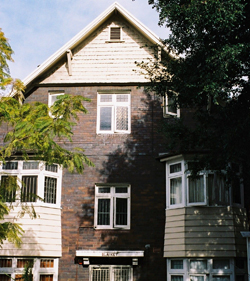Australia: asylum seekers struggle to rebuild their lives with little government support
04 September 2010

Sydney, 4 September 2010 – Yussef (not his real name) came to Australia as an asylum seeker seven months ago. He left home country, his job and family behind and came to Australia, hoping to find a ‘safe home’ for his wife and children. Yussef applied for asylum soon after his arrival and hoped he would receive a quick decision.
However, as the months dragged on, he found himself without access to income and the inability to work to support himself. He was then referred to JRS and now receives accommodation and financial assistance through JRS’ Shelter Project. “I felt deeply ashamed at first to receive this help”, says Yussef. “I’ve always been self-sufficient and never asked for charity before, but I am very grateful to JRS for their help. Life would have been so much more difficult without their support”. Yussef also worries constantly about the safety of his family, “now that I’m no longer with them, they could be sent to Iraq at any moment”.
While the numbers of asylum seekers coming to Australia and living in the community is not large (only about 5,000 came in 2009), many struggle to survive and make ends meet whilst awaiting an outcome to their asylum applications. Although Australia possesses a fairly good third-country resettlement programme, there is an obvious lack of government support services for asylum seekers living in the community, especially in terms of accommodation. At the moment, JRS provides the only mid- to long-term accommodation facilities in the inner Sydney area.
Only about half of the asylum seekers in the community are eligible for a government-funded financial assistance programme, and a large number have had their work rights taken away, especially in the later stages of appeal in their status resolution process. Like Yussef, many have to wait for months or even longer than a year to find out whether they will be allowed to stay in Australia. Without work rights, there is also no access to health care. And even with a work permit, finding a job in the current economic climate can be extremely tough, especially when having to compete with locals who also find themselves out of work.
With the help of volunteers, the JRS Shelter Project also provides job search assistance and coaching to those asylum seekers who have permission to work. Unfortunately, while a good number of the people JRS supports have high level qualifications and experience—as teachers, doctors, IT personnel, accountants, business people, etc—they are not able to practice these skills in Australia. Usually, the accreditation process takes a long time (years in some professions) and in some cases it is actually faster (if not easier) to go back to university to complete a similar degree. As Yussef puts it, “Yes, I’m trying to get my qualifications credited in this country. It’s a long process and very expensive too, but I know that for the sake of my family I cannot give up.” But of course in the meantime people have to survive and need to find work. “I don’t really care what I do, I just need to find a job”, is a common utterance we hear from the people who come to our office. And most are grateful for the menial jobs—as cleaners, lawnmowers, factory workers—they are able to find.
The majority of those who are able to get work also send most of their income back to their families and even friends. Having been the breadwinners in their countries of origin, there is in many cases a great deal of expectation that they will continue to provide for them even from afar. “People think that because I am in Australia now, I should be able to find a job easily and send back lots of money. It is very hard for them to understand that things are so difficult here. Sometimes I wonder whether they believe me when I talk about my hardships”, says Francis (not his real name), a former asylum seeker from Western Africa, who has now received permanent protection, but is still looking for a job in IT.
The current political climate has also become an issue of concern for asylum seekers. Though there is still much sympathy for refugees being resettled from camps, the current influx of asylum seekers arriving in Australia by boat has become one of the main issues on the political agenda during this election year. Used as political pawns, asylum seekers are still being labelled ‘queue jumpers’ or ‘illegals’ by one political party or as a ‘border protection issue’ by another and have of late (despite the very small numbers still arriving to Australian shores) been linked with migration concerns as to whether Australia can sustain a rapidly growing population. Unfortunately, these political debates divert attention from what should be of main concern to the Australian people, namely, how to offer care and compassion to a group of very vulnerable people who have already experienced a great deal of trauma, and who are yearning to be welcomed.
Despite these challenges and difficulties, many of the people JRS supports continue to hold on to hope. “I don’t have any other choice” says Yussef. He is still waiting for a final decision on his asylum application—pending on the outcome of his security checks—but is confident that he’ll be able to stay in Australia. “And in a few years, once I’m settled in my new country, I’ll do what I can to repay JRS for their kindness and welcome”, he says in a voice that reveals great conviction and sincerity.


